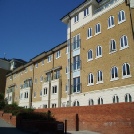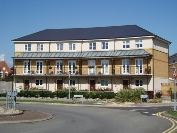
Helping UK new home buyers
brand-newhomes.co.uk

What is the difference between an apartment and a flat?
Generally a Flat is a British word used since the 19th century to describe a home that occupied a whole floor in a converted large Victorian house. Therefore, most flats occupy a single storey of a building. The living accommodation is not stand-alone and shares a common entrance from the street with the other flats
Disadvantages of owning an apartment
 An Apartment is the American word for a Flat. House builders and developers prefer the word apartment as it implies luxury and exclusivity better than the word flat does. It could also be said that an apartment is a brand new flat and conversely a flat is a second-hand apartment, as most estate agents in the UK tend to use the word flat.
An Apartment is the American word for a Flat. House builders and developers prefer the word apartment as it implies luxury and exclusivity better than the word flat does. It could also be said that an apartment is a brand new flat and conversely a flat is a second-hand apartment, as most estate agents in the UK tend to use the word flat.
Advantages of owning an apartment:
- Increased security – this applies to upper floor apartments only.
- Usually much cheaper to purchase than a house of a similar floor area.
- Lower property values result in a lower Council Tax banding.
- Additional facilities may be provided for example a swimming pool in the
complex.
- No garden to maintain and no responsibility for organising building
maintenance.
- Ability to live in an area like a city centre where owning a house would be
prohibitively expensive.
- Less responsibilities than with owning a house.
- More social contact with neighbours.
Disadvantages of owning an apartment:
- Ground rent and service charges. Often owners have no control over the amount or increase in service charges.
- Additional restrictive covenants.
- Reduced privacy.
- Noisy neighbours. Additional neighbours above and below increase the
likelihood of disturbance and nuisance.
- Limited living and reduced storage space.
- No private garden - no clothes drying area.
- Need freeholder’s permission to make changes to the building structure.
- Limited and often unsecured parking.
- Contents insurance is usually higher and discounts for joint buildings and
contents insurance are not available.
Leasehold
An apartment property will usually be sold as leasehold, which means that the land on which the property is built is not part of the sale. A leasehold property is only owned for a specified number of years, the lease period, after which the ownership reverts to the freeholder. Ownership is therefore limited to the period of the lease, however the lease can be extended by making a payment to the freeholder.
The 1993 Leasehold Reform Act makes it possible for leaseholders to extend their lease by 90 years and gives leaseholders the right to buy the freehold between them. If the freeholder decides to sell the freehold he must give the present leaseholders first right of refusal to buy it. Extending a lease can cost £45,000 to £60,000 and involve administration costs of around £5,000 if the lease is less than 80 years.
 Newly built flats are sold with lease periods of at least 99 or 125 years, with some offered with a 999-year lease which is effectively the lifetime of the property. The longer the lease the better.
Newly built flats are sold with lease periods of at least 99 or 125 years, with some offered with a 999-year lease which is effectively the lifetime of the property. The longer the lease the better.
Many newly built apartments are now sold with a share of the freehold. Owners of a joint freehold can choose to manage the building themselves or employ a managing agent. Employing a managing agent avoids potential disagreements that inevitably arise when owners manage a building themselves.
Ground rent
Ground rent is a nominal rent for the land on which an apartment block is built and is usually around £100 to £250 per year and is paid to the freeholder - the owner of the land. The lease should state if the ground rent is fixed or can be reviewed after a certain time period. Freeholders have the right to chase for payment of the ground rent going back six years with responsibility for payment resting with the current owner of the lease. Failure to pay ground rent could result in forfeiture of the lease.
Watch out for new homes being sold with a ground rent review clause in the lease, meaning ground rents will rise substantially the the years to come and could even mean the home is impossible to sell. The Leasehold Knowledge Partnership is a registered charity and was set up to protect ordinary leaseholders’ interests.
The Leasehold Advisory Service (LEASE)
31 Worship Street
London EC2A 2DX Tel: 020 7374 5380
Fax: 020 7374 5373
E-mail: info@lease-advice.org.uk
Covenants are legally binding obligations. They require both the freeholder and leaseholder to do or not do certain things. Restrictions and regulations can be stipulated governing how leaseholders are required to behave. In particular they can include such things as noise levels, the keeping of pets, renting, exterior decoration, waste disposal, parking, business use, the drying of laundry and the use of swimming pools and other recreational facilities. Check the regulations and discuss any restrictions you’re unsure about with your solicitor.
Annual Service charge also known as Maintenance or Management charge
These charges are calculated according to each owner’s share of the building or development. You must ascertain what the charges are likely to be. The annual Service Charge will be an ongoing major expense that should be taken into account and budgeted for. Generally most house builders pass on the freehold to a particular company and they take over the ongoing management of the building when all the apartments have been sold.
The freeholder provides buildings insurance, but you will may be required to have third party insurance for any damage you may be responsible for to other apartments as a result of a water leak or fire.
Service charges can be billed monthly or quarterly or biannually and will be adjusted at the end of the year when the actual expenditure is known and the annual accounts have been produced. Service charges vary considerably and can run to thousands of pounds (£3,000 or more a year isn’t unusual) especially for luxury developments with several amenities - for example a gym, health club and swimming pool. In most cases service charges will increase year on year.
There have been instances where landlords have used threats of expensive court action to intimidate apartment owners into paying ever higher fees. Many landlords have increased their service charges to such an extent that they bear little or no resemblance to the actual costs. High charges for major repairs should not be an issue with a brand new apartment for at least ten years. It remains vital, when buying a leasehold property, to obtain legal advice and have the lease checked by a solicitor. Be aware, properties on retirement developments can and do have very high annual charges.
Service charges can include the following:
- Car park enforcement
- Communal car park - gates, lighting cameras etc
- Entry Phone system
- Fire alarm and fire equipment
- Landlord electricity and water utility bills
- Lift maintenance and safety inspections
- TV aerials and satellite system
- Buildings insurance
- Management administration fees
- Accountancy fees
- Future maintenance fund for major repairs
- Cleaning of communal areas including roads and pathways
- Landscape garden maintenance and grass cutting
- Membership and upkeep of communal facilities such as swimming pool
- Caretakers and porters
What to consider when buying a brand new flat or apartment
Buying a new apartment
| Micro Homes |
| Studio Apartments |
| Apartments |
| Townhouses |
| Mews Houses |
| Terraced Houses |
| Detached Houses |
| Buying an apartment |
| Considerations when buying a flat |
| Leasehold Property |
| Retirement developments |
| Part exchanging |
| New homes can be bad for your health |
| Why buyers avoid new homes |
| Condensing boilers |
| Brownfield land |
| Consumer Code Dispute Resolution |
| Claiming Compensation - Adjudication Scheme |
| Tricks of the showhome |
| Sales advisors and sales centres |
| Timber frame construction |
| Timber frame new homes |
| Timber frame - what you need to know |
| Quality issues with timber frame homes |
| Fire and timber frame new homes |
| What the NHBC does |
| New stamp duty calculator |
| Scotland LBTT calculator |
| Removals and moving home |
| Packing and planning the move |
| Checklist for change of address |
| Choosing a mortgage |
| Avoiding mortgage refusal |
| Help to Buy |
| First Buy |
| New Buy |
| Best Buys |
| Home Insurance |
| How to save on home insurance |
| Home insurance policy conditions |
| Flood insurance claim |
| Renting do's and don'ts |
| Section 106 Agreements |
| Community Infrastructure Levy 2010 |
| After you move in |
| DIY and home improvement |
| Choosing a tradesman |
| When you find problems |
| How to complain |
| Making a Subject Access Request |
| Taking a builder to court |
| TEMPLATE LETTERS |
| Site Manager |
| Regional Managing Director 1 |
| Regional Managing Director 2 |
| Executive Chairman 1 |
| Executive Chairman final letter |
| NHBC warranty claim |
| Subject Access Request |
